Bananas are not only flavorful and a natural, easy-to-bring snack! The tropical fruit is an incredibly healthy and nutritious food – a superfood! Or a superfruit! Bananas even have countless beneficial effects on human health and are traditionally used in ethnobotanical medicine. The extraordinary benefits of tropical fruits can be attributed to the fact that they are evolutionary foods for humans. Let’s explore what science and experience teaches us…
What are Superfruits?
Banana is a superfruit, and its well-researched benefits will leave you stunned. But let’s be clear: all edible tropical fruits are slowly being discovered as true superfoods for humans, so the term “superfruits” is being birthed into existence.
Why tropical fruits? The reason tropical fruits are so healthy lies in our evolutionary history and, therefore, in human ecology. Like all apes, humans are frugivores, species specialized in foraging and eating fruit. A diet deficient in fruit is one of the main risk factors for poor health and increased mortality (Falcomer et al., 2019). While all fruits are beneficial for human health, tropical fruits are a category on their own, with the potential to boost health to another level if consumed in abundance. Why tropical fruits? Because humans originated in tropical forests, and our ancestors are highly frugivorous, which makes tropical fruits our most important evolutionary food source! An example to illustrate the evolutionary match is the fatty acid composition in tropical fruits compared to other fruits: tropical fruits contain the perfect ratio of omega-3 to 6, while most fruits from colder climates do not – because they have evolved as food sources for birds, not primates or other mammals.
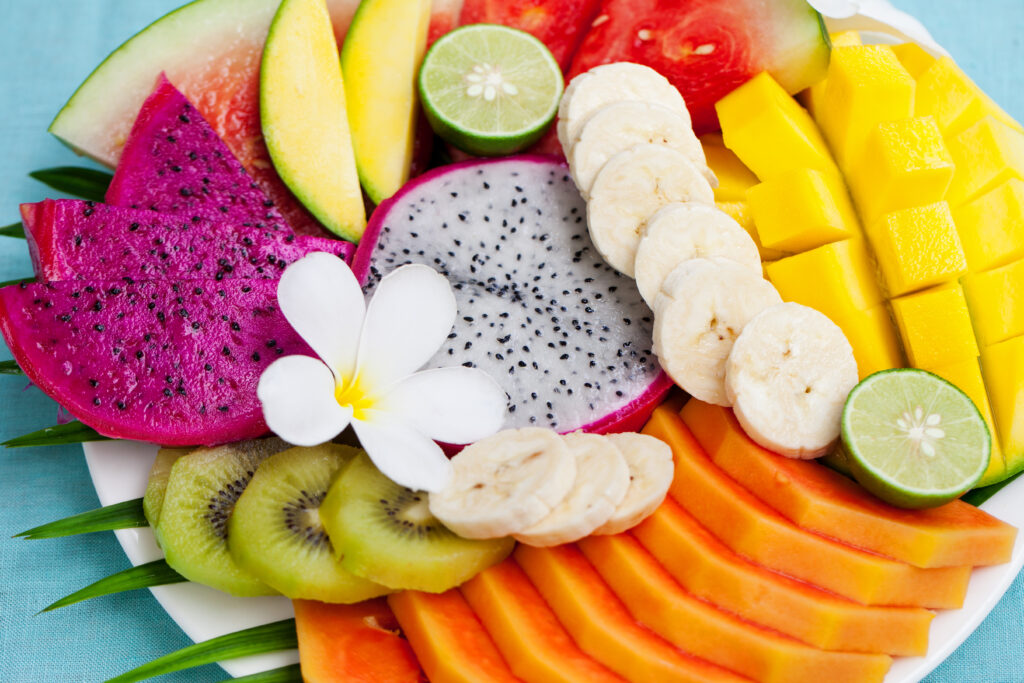
This is why eating tropical fruits in their raw, unaltered state is so delicious. Our taste buds do not lie, as they have evolved to indicate to us in nature what’s food and what’s not. Every animal in nature instinctively knows what is edible. We know it, too, if we do not let cultural filters bias our perception. Besides instincts, many more adaptations strongly suggest that humans are frugivores!
It’s not surprising that people living in the tropics are aware of the power of their fruits. They are not only occasionally used as home remedies but have a long history of medicinal uses. So, how come we still see health problems in tropical regions? Because many tropical countries do not base their traditional dishes on fruits but are often heavy in animal foods, legumes, and grains. Consuming abundant tropical fruits is the key to the myriad of health benefits, not only as an additional treat or dessert (which, of course, is better than nothing!).
Besides countless reports of people adopting a diet high in fruits to boost their health, we find a growing number of studies and evidence showing the health benefits of the beautiful fruits from the tropic paradise! In fact, there is no shortage of scientific evidence backing up what tropical indigenous people have long known!
” the consumption of this type of fruit should be recommended by several health organizations around the world for its beneficial health properties. In the same way, it is important to increase awareness of the beneficial health effect of the bioactive compounds that can be obtained by tropical fruits consumption.”
Sayago-Ayerdi et al., 2021
“These bioactive compounds (from tropical fruits) have been shown to possess various in vitro and in vivo biological activities, including antioxidant, antimicrobial, antiviral, anti-inflammatory, anti-aging, neuroprotective, and among others. Therefore, obtaining functional ingredients from tropical fruits considered exotic is viable and used to develop functional and nutraceutical foods, prepare products for the pharmaceutical industry…”
Enriquez-Valencia et al. (2020)
“The term “superfruit” has gained increasing usage and attention recently with the marketing strategy to promote the extraordinary health benefits of some exotic fruits…The phytochemicals from superfruits are bioaccessible and bioavailable in humans with promising health benefits.”
Chang et al., 2023
Just imagine what would happen if we make high-quality tropical fruits an substantial part of our diet!
Also, read our article on why temperate fruits cannot take the role of tropical fruits in our health!
What are superfoods, really?
Superfoods are commonly used to describe foods that are more nutrient-dense than “normal” foods, high in antioxidants or contain unique phytochemicals with proven health benefits. They are placed somewhere between food and medicine, which is a somewhat artificial distinction.
Not all so-called superfoods are actually superfoods! Unfortunately, many foods that are commonly referred to as superfoods (visit Harvard’s list or healthline.com’s list of superfoods) are not really the healthiest choice there is for humans. While they are nutrient-dense and provide benefits, many of those foods also contain high levels of anti-nutrients! Sally. K . Norton has dedicated a whole book (Toxic Superfoods) to the subject. Most superfoods are foods that have not been cultivated and altered as much as other common foods. This has its benefits – but also its downside: Selective breeding ensures that the harsh self-protective compounds that plants evolve towards animals are minimized. Many superfoods are foods we have not evolved to eat; thus, their harsh compounds can be tough on us. The solution is to eat nutrient-dense foods that we have actually evolved with:
True superfoods are the evolutionary food sources of humans in nature. Superfoods are species-specific foods, the foods we prefer in nature, raw, unaltered, and unprocessed foods – in the case of apes, the main evolutionary foods are fruits, nuts, and greens that are native to the tropics. These are our true superfoods, while herbs and medicinal plants are medicine.
This explains why tropical fruits are being discovered as the key to human health! Let’s start with banana:
Superfruit Banana – Musa spp.
Banana is one of the most beloved tropical fruits known for its texture, nutrition, and flavor. There are many types of wild and cultivated bananas all around the world that grow in the tropical belt. The banana plant is actually not a tree, it’s a giant herb, and bananas are giant berries! Bananas can be grown in subtropical areas, too. The fruit is relatively easy to transport and ripens after harvest, which fortunately makes it an easy fruit to get in colder areas.
Because banana is one of the world’s most cultivated and low-cost fruits, they have been altered for favorable traits for production and commerce, taking away from the optimal nutritional composition for health.
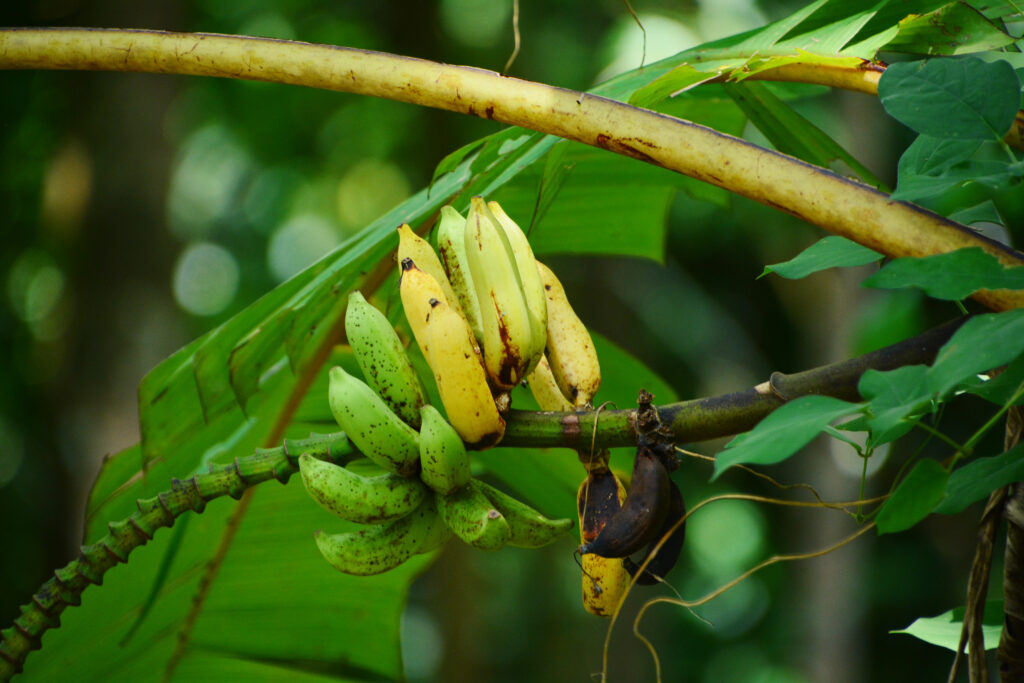
The “supermarket banana,” called the Cavendish banana, contains less flavorful, antioxidant phenolic components than less altered types.
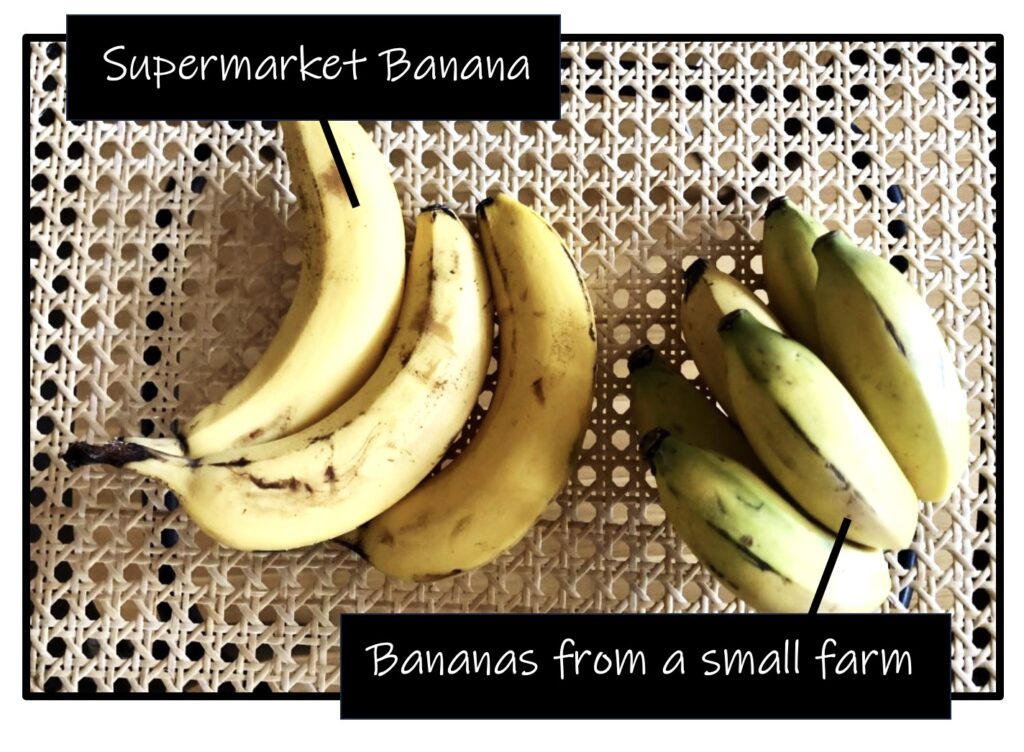
Therefore, if you have never had a tree-ripened banana from a small producer, you couldn’t know how life-transforming those sweet, nourishing fruits with a naturally slightly sour touch (almost like apples) are: you will realize that you are indeed a frugivore by nature! On top of the joy of eating high-quality bananas, the fruits and other parts of the Musa spp plant offer nearly countless benefits for human health! Banana is a highly nutrient-dense and energetic food. Bananas are particularly high in vitamin B6, potassium, magnesium, manganese, copper, and the amino acid tryptophan, contributing significantly to our daily nutritional needs.
Besides nutrients, bananas contain a wealth of phenolic compounds that have a plethora of health benefits:
“Banana pulp contains a plethora of phenolic compounds, such as catechin, epicatechin, lignin, tannin, and anthocyanin. Particularly, recent studies have identified several phenolic compounds, including epicatechin, gallocatechin, and a variety of phenolic acids (…) as the major components contained in banana.”
Kritsi et al. (2023)
Besides their health-boosting effects, polyphenols are also the molecules responsible for the flavor and aroma of the fruit! In this case, our biological instincts don’t mislead us when eating a tasty banana – it tastes good, it is good!
Dopamine is one of the well-characterized phenolic compounds found in high levels in banana fruit pulp, and its peel (Kanazawa et al., 2000). Dopamine is a phenolic neurotransmitter in humans (also known as the happy hormone) with a potent anti-oxidant effect similar to vitamin C. The compound has other pleasant benefits, such as protecting against intestinal damage, skin and brain health. People with different types of neurological issues take dopamine-enhancing drugs, and many types of drugs that are involved in substance abuse enhance dopamine. So why not get it the natural and healthy way – straight from nature within a matrix of other health-boosting compounds? For example, bananas’ high tryptophan content contributes additionally to healthy brain function.
Do bananas contain vitamin B12?
Bananas are popular as nutrient and mineral-rich fruit. Lately, it is being mentioned as a plant-based source of vitamin B12 – which is very surprising, given that B12 is found in animal-based foods and is produced by microorganisms! Do bananas really contain vitamin B12? Recent studies describe banana pulp and peel as a source of vitamin B12. See here, here, and here. A vitamin B12-containing fruit is something that would contribute to a shift in dogma concerning B12 and plant-based nutrition. I can’t fully grasp the idea of a B12-containing fruit yet – it’s too good to be true!
Traditionally, bananas were used to combat anemia, which could be due to two key nutrients for blood building: iron and vitamin B12. The iron content is sometimes described as low and sometimes as high. Such contradicting information is not surprising considering the differences in the quality of the fruits. I assume that the vitamin B12 content of bananas is variable, too, and I would not consider them a reliable source, especially if you cannot get high-quality produce. Further, there is a lack of information on the type of B12 found in bananas, whether it’s a bioactive form of cobalamin or pseudocobalamin.
This topic is highly relevant for plant-based diets, and more research on whether bananas can be a B12 source for humans would further aid in understanding the human diet and the role of tropical fruits in it!
Health Benefits of Bananas
Bananas look like they are made especially for apes and humans – and they actually are! So much so that they are used for the most fragile groups of humans: bananas are used in diets, especially for babies and elderlies, as they are nutrient-dense, low-fat, and especially friendly to the digestive tract. They are used as a food to regulate the digestion.
Some of the health benefits of banana pulp (the fruit itself) that have been shown in scientific studies are:
- Bananas have a positive effect on the microbiome.
- Bananas have anti-diabetic effects.
- Bananas have anti-ulcer effects.
- Bananas show anti-tumor activities.
- Bananas have anti-microbial effects.
- Bananas have antioxidant effects.
Besides the pulp, nearly all parts of the banana plant are used in traditional medicine. In traditional medicine, green, powdered bananas are used for issues of the intestinal tract, insulin issues, and support of the liver and kidneys. Banana pulp is used as an antidepressant in gastrointestinal health, in blood pressure control, and against anemia. The peel is known to be very high in antioxidants and is used for wound healing for its antimicrobial properties and lately also as a functional food in its powdered form to address nutritional deficiencies and to prevent disease: “Banana peel, which is usually discarded, should also be considered to be a functional food source against cancer and heart disease since the banana peel is rich in gallocatechin.” (Fahrasmane & Parfait, 2014)
“…banana fruit from India have been used traditionally to fight off a large number of sicknesses.”
Ahmad et al. (2018)
Please expand to see the references used to summarize the health benefits of bananas:
- Amini Khoozani A, Birch J, Bekhit AEA. Production, application and health effects of banana pulp and peel flour in the food industry. J Food Sci Technol. 2019 Feb;56(2):548-559. doi: 10.1007/s13197-018-03562-z. Epub 2019 Feb 8. PMID: 30906012; PMCID: PMC6400781.
- Isnaeni, I., Zufara, B.S. and Lewa, I.W. (2020) ‘Alternative optical methods for qualitative detection of vitamin B6 and B12 of Banana’, Jurnal Teknologi dan Industri Pangan, 31(2), pp. 147–154. doi:10.6066/jtip.2020.31.2.147.
- Grossman A. Nutrient Acquisition: The Generation of Bioactive Vitamin B12 by Microalgae. Curr Biol. 2016 Apr 25;26(8):R319-21. doi: 10.1016/j.cub.2016.02.047. PMID: 27115686.
- Oyeyinka, B.O.; Afolayan, A.J. Suitability of Banana and Plantain Fruits in Modulating Neurodegenerative Diseases: Implicating the In Vitro and In Vivo Evidence from Neuroactive Narratives of Constituent Biomolecules. Foods 2022, 11, 2263. https://doi.org/10.3390/foods11152263
- Kritsi E, Tsiaka T, Sotiroudis G, Mouka E, Aouant K, Ladika G, Zoumpoulakis P, Cavouras D, Sinanoglou VJ. Potential Health Benefits of Banana Phenolic Content during Ripening by Implementing Analytical and In Silico Techniques. Life. 2023; 13(2):332. https://doi.org/10.3390/life13020332
- Kanazawa, Kazuki & Sakakibara, Hiroyuki. (2000). High Content of Dopamine, a Strong Antioxidant, in Cavendish Banana. Journal of agricultural and food chemistry. 48. 844-8. 10.1021/jf9909860.
- Powthong P, Jantrapanukorn B, Suntornthiticharoen P, Laohaphatanalert K. Study of prebiotic properties of selected banana species in Thailand. J Food Sci Technol. 2020 Jul;57(7):2490-2500. doi: 10.1007/s13197-020-04284-x. Epub 2020 Feb 5. PMID: 32549599; PMCID: PMC7270385.
- Fahrasmane, L. & Parfait, B. & Aurore, Guylene. (2014). Bananas, a source of compounds with health properties. Acta Horticulturae. 1040. 75-82. 10.17660/ActaHortic.2014.1040.9.
- Falcomer AL, Riquette RFR, de Lima BR, Ginani VC, Zandonadi RP. Health Benefits of Green Banana Consumption: A Systematic Review. Nutrients. 2019 May 29;11(6):1222. doi: 10.3390/nu11061222. PMID: 31146437; PMCID: PMC6627159.
- Ahmad, B.A. et al. (2019) Pharmacological activities of banana, IntechOpen. Available at: https://www.intechopen.com/chapters/65459 (Accessed: 20 November 2023).
Let Tropical Fruits be thy Medicine
This Superfruit Series intends to show that tropical fruits are more than just a pleasant treat or dessert but build the very foundation of the natural nutrition of apes, including humans. This is reflected in the biochemical miracles that we find in fruits, which are highly beneficial and even medicinal. The compounds found in these fruits have co-evolved in a mutualistic dynamic with primates as their seed-disperser. The result is a fountain of nutrition and secondary plant metabolites biologically matched to the frugivore.
It’s no surprise that most wild tropical fruits are edible for humans and that new potent pharmaceuticals are being discovered in tropical plants, including fruits. It is simply reconnecting with our natural habitat – getting the food and compounds we have evolved to get in nature.
As academic sciences just recently started to look into the benefits of commercialized tropical fruits, many wild and underutilized fruits in tropical forests have been used as medicine by locals for centuries. Those unaltered fruits potentially have even more natural medicinal power:
“Southeast Asian countries, including Malaysia, have tropical rainforests with a variety of fruit-bearing trees. These trees are evergreen and growing throughout the year. Many of these trees produce edible fruit for animals living within the scrubs and some of these fruits are even used by the local communities in their traditional medicine… ambarella (Spondias dulcis L.), cempedak (Artocarpus integer [Thunb.] Merr.), langsat (Lansium domesticumCorrêa), pulasan (Nephelium mutabile Blume), and salak (Salacca zalacca [Gaertn.] Voss), whereas bambangan (Mangifera pajang Kosterm.), dabai (Canarium odontophyllum Miq.), durian nyekak (Durio kutejensis Hassk. & Becc.), and some wild bananas (Musa spp.) are found mainly in the Borneo market because they are native to Borneo Island. However, some of these fruits are still collected from their wildly grown trees, and their potential medicinal properties are not well understood.”
Hock Eng Khoo et al. (2016)
Knowing our evolutionary past with tropical fruits and the plethora of beneficial biochemicals in those naturally appealing and delicious foods takes “let food be thy medicine and medicine be thy food” to another level! And I can confidently say that we should add a slightly altered version to this wisdom:
“Let tropical fruits be thy food and medicine!”
Martina Spaeni Lima
Portraying the benefits of bananas is part of the growing superfruit Series dedicated to uncovering the stunning chemical compounds in tropical fruits and their effects on health:
- Açai
- Acerola
- Avocado
- Bananas
- Breadfruit
- Mangosteen
- Custard Apple
- Guava
- Durian
- Tropical Figs
- Rambutan
- Lychee
- Dragonfruit
- Papaya
- Mango
- Passionfruit
- Granadilla
- Soursop
- Starfruit
Other References
- Chang, S.K., Alasalvar, C. and Shahidi, F. (2018) ‘Superfruits: Phytochemicals, antioxidant efficacies, and health effects – A comprehensive review’, Critical Reviews in Food Science and Nutrition, 59(10), pp. 1580–1604. doi:10.1080/10408398.2017.1422111.
- Falcomer AL, Riquette RFR, de Lima BR, Ginani VC, Zandonadi RP. Health Benefits of Green Banana Consumption: A Systematic Review. Nutrients. 2019 May 29;11(6):1222. doi: 10.3390/nu11061222. PMID: 31146437; PMCID: PMC6627159.
- Ganguli, Barin & Narkhede, Satish & Haldankar, Parag & Bhattacharyya, Tapas. (2019). Abstract Wild Mangoes -An Incredible Wealth for Posterity. 15. 1258-1264.
- Hill, A. (2023) 16 superfoods that are worthy of the title, Healthline. Available at: https://www.healthline.com/nutrition/true-superfoods#TOC_TITLE_HDR_12 (Accessed: 16 November 2023).
- Katherine D. McManus, M. (2022) 10 superfoods to boost a healthy diet, Harvard Health. Available at: https://www.health.harvard.edu/blog/10-superfoods-to-boost-a-healthy-diet-2018082914463 (Accessed: 16 November 2023).
- Toxic superfoods, by Sally K. Norton, mph (2023) Sally K. Norton. Available at: https://sallyknorton.com/toxic_superfoods/ (Accessed: 16 November 2023).
- S. Sayago-Ayerdi, D. L. García-Martínez, A. C. Ramírez-Castillo, H. R. Ramírez-Concepción, M. Viuda-Martos, (2021) Tropical fruits and their co-products as bioactive compounds and their health effects: A Review. Foods. 10, 1952
- Enriquez-Valencia, S. et al. (2020) ‘Propiedades Bioactivas de Frutas Tropicales Exóticas y Sus Beneficios a la salud’, Archivos Latinoamericanos de Nutrición, 70(3), pp. 205–214. doi:10.37527/2020.70.3.006.
- Gunter, N.V. et al. (2020) ‘Natural xanthones and skin inflammatory diseases: Multitargeting mechanisms of action and potential application’, Frontiers in Pharmacology, 11. doi:10.3389/fphar.2020.594202.
- Khoo HE, Azlan A, Kong KW, Ismail A. Phytochemicals and Medicinal Properties of Indigenous Tropical Fruits with Potential for Commercial Development. Evid Based Complement Alternat Med. 2016;2016:7591951. doi: 10.1155/2016/7591951. Epub 2016 May 31. PMID: 27340420; PMCID: PMC4906201.


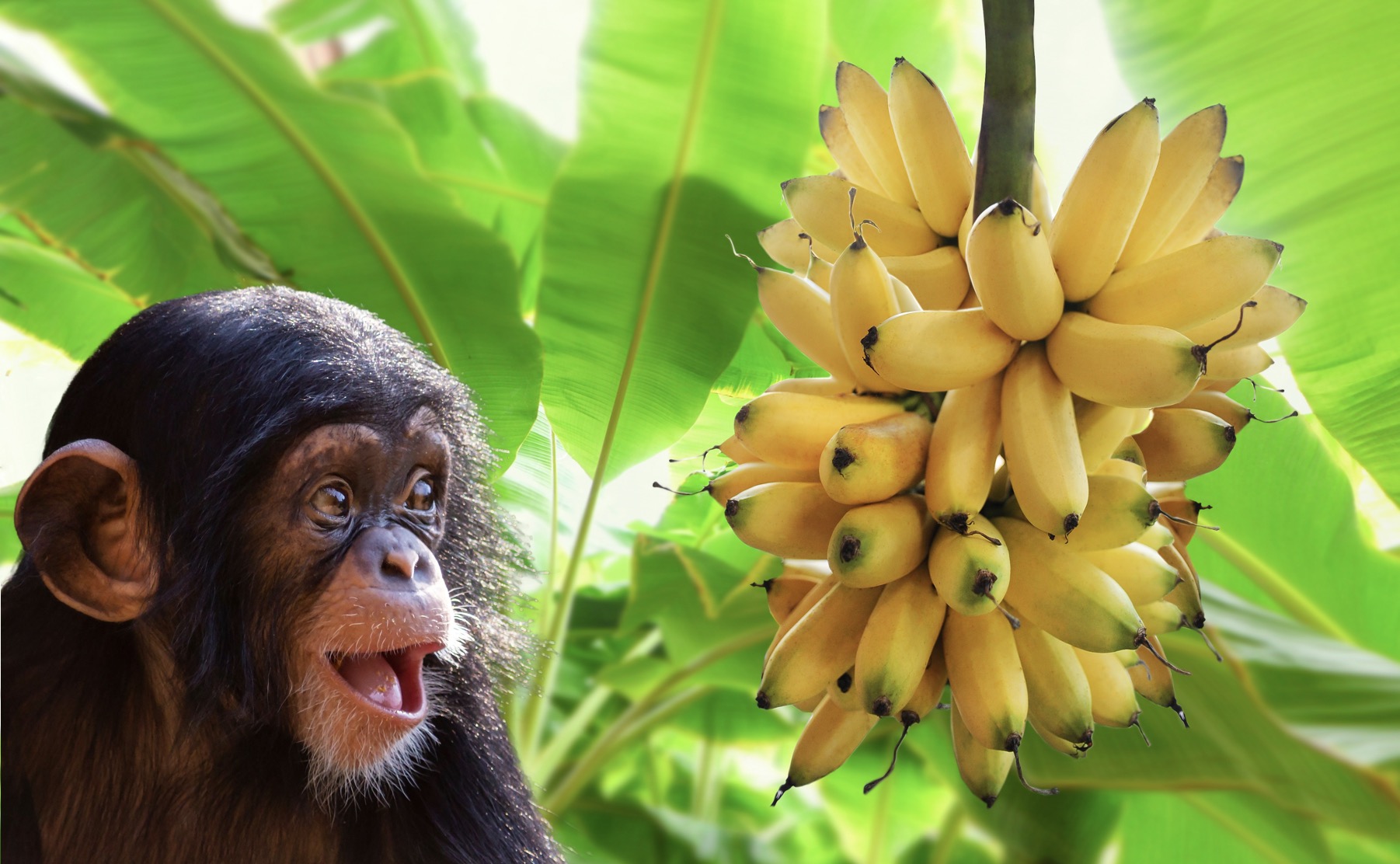
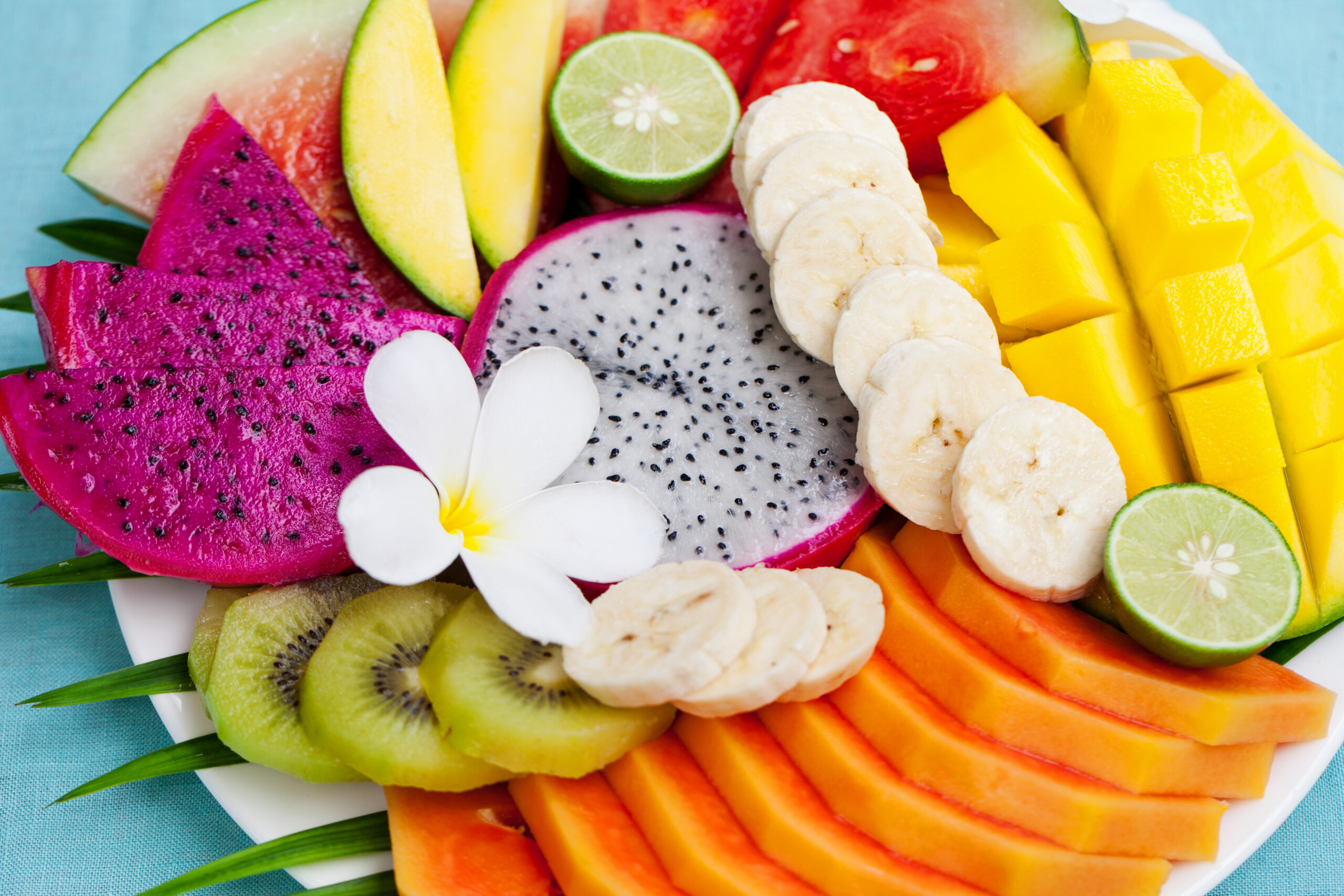
Add Comment